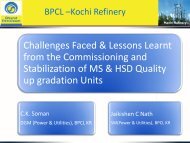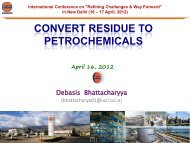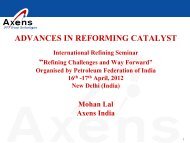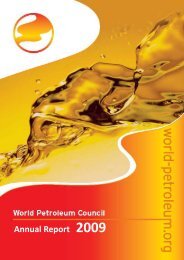pdf here - World Petroleum Council
pdf here - World Petroleum Council
pdf here - World Petroleum Council
You also want an ePaper? Increase the reach of your titles
YUMPU automatically turns print PDFs into web optimized ePapers that Google loves.
Petrochemicals in healthcare and cosmetics<br />
Are petrochemicals toxic in cosmetics<br />
By Dene Godfrey<br />
It is all too common to see claims on cosmetics and<br />
websites that the products are “free from” certain<br />
substances. T<strong>here</strong> is a much debate as to the<br />
acceptability of this prac tice and certain countries,<br />
such as France, South Africa and Canada,<br />
ban companies from making such claims, either<br />
by regulation or industry code of practice. Indeed,<br />
the forthcoming revision of EU cosmetics legis lation,<br />
the Cosmetics Regulation (EC) No. 1223/2009,<br />
due to be enacted mid-2013 will make it illegal to<br />
make such claims under most circumstances.<br />
These days, it is virtually impossible to see the<br />
word “petrochemical” without it being associated<br />
with the word “free” or “does not contain” or a<br />
negative adjective such as “toxic”. Yet products<br />
containing oil or petrochemicals, which come<br />
from oil, are not necessarily toxic or harmful.<br />
Oil itself is totally natural in origin. Synthetic<br />
chemicals produced from oil are not natural,<br />
although many may be described as “natureidentical”,<br />
however this does not mean that petrochemicals<br />
used for cosmetics should all be classified<br />
as “toxic”. The fact that a chemical has been<br />
derived from oil/petroleum in no way deter mines<br />
the toxicity of the chemical. The toxicity of any<br />
substance, including petro chemicals used in<br />
cosmetics, is not related to its origin nor to the<br />
origin of its precursors.<br />
While t<strong>here</strong> are environmental issues surrounding<br />
the exploration, extraction and refining of oil,<br />
the singling out of the cosmetics industry for<br />
using “toxic” petrochemicals is not accurate. With<br />
less than 0.1% of total oil production used to<br />
provide ingredients for cosmetics, sustainability is<br />
not a major concern. Many products which claim<br />
to be “petrochemical-free” contain sodium benzoate<br />
and/or potassium sorbate which are both<br />
petrochemicals, albeit ones that exist in nature.<br />
These ingredients require a multi-stage synthesis<br />
with many petrochemicals involved along the<br />
way, but this does not make them any less safe.<br />
A common claim for cosmetics is that they are<br />
“all-natural” or “100% natural”. However, this claim<br />
needs to be closely examined. “Natural” can also<br />
be confused with “organic”. Only two questions<br />
need to be asked to determine of a substance is<br />
“natural”. Does the substance exist in nature Is<br />
the substance extracted from nature with any<br />
chemical modification If the substance does not<br />
exist in nature, it cannot be described as “natural”<br />
even if natural substances have been used<br />
exclusively in its manufacture. This can only be<br />
described as “nature-derived”.<br />
However, taking the “nature-derived” definition<br />
to its logical conclusion, the only question is to<br />
how many stages of processing has the substance<br />
been exposed. This introduces the concept of “degrees<br />
of processing”. Given that so few cosmetics<br />
ingredients are truly natural, how many degrees<br />
of processing are acceptable to keep the ingredient<br />
as close to nature as possible This is w<strong>here</strong> the discussion<br />
becomes subjective rather than scientific.<br />
Furthermore, can “nature-identical” substances<br />
be described as “100% natural” Part of the consider<br />
ation <strong>here</strong> should be the source of raw materi als<br />
used to manufacture “nature-identical” products.<br />
The two most common “nature-identical” ingre dients<br />
are sodium benzoate and potassium sorbate<br />
– as stated earlier, these are both petrochemicals.<br />
T<strong>here</strong> is no natural source for these ingredients and<br />
all usage in cosmetics is from synthetic production.<br />
Many products which claim to be “all-natural”<br />
use petrochemicals but this does not mean they<br />
are unsafe.<br />
Dene Godfrey, a scientist, council member and<br />
past president of the UK Society of Cosmetic<br />
Scientists, has written on the use of petrochemicals<br />
in the cosmetics industry and the safety issues. This<br />
is an edited version of his article, Petrochemicals:<br />
Confusion and Hypocrisy and 100% Natural<br />
Almost 100% Certainly Not, first published on<br />
www.personalcaretruth.com<br />
Join us<br />
WHAT YOU CAN EXPECT<br />
• 1500 – 2000 international delegates<br />
• Network with international energy experts<br />
• Share technical innovations and sustainable energy solutions<br />
• Engage industry peers on local and global energy issues<br />
VISIT ALBERTA<br />
Information<br />
2013 WPC Youth Forum Committee<br />
info@wpcyouthforum.com<br />
+ 1 604 661 4953<br />
Please visit our website for more<br />
information about the conference.<br />
48<br />
WPC Guide<br />
2013YouthForum 2013YouthForum www.wpcyouthforum.com

















